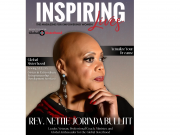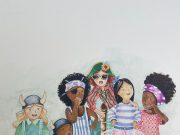By Nancy Mramor Kajuth
Style is a way of saying who you are without having to speak. ~ Rachel Zoe
Who is Lady Gaga? Is it even necessary to ask? She is a talented, creative unafraid woman who is making a difference. How do you know? Not just by her music and famous acting performances but by what you see the moment she comes into a room. Her fashion is a form of communication that precludes words.
We use fashion to feel a certain way, to convey a certain message and to suggest our identity. In the same way that the breath connects the mind and body, fashion is the link that brings the inner person out to meet the world. And it’s not frivolous, it’s what we do every day, and it’s serious enough to generate an International Journal of Fashion Studies and a master’s degree in Psychology of Fashion, for the truly dedicated fashionista.
Internationally, there has always been ambivalence toward fashion, an admiration and desire to see the art and creativity of clothing, while also considering it a trivial and superficial pursuit. But if we look further, it is both a reflection of society’s current movements and a movement that shapes society. While we may determine what we want, leading fashion to become a reflection of our desires, fashion creates our desires and styles through its beauty and enigmatic construction.
So what does your style say about you? Your psychological strengths and weaknesses can show up in your clothing as symbolic expressions of who you are in character, competence, intelligence, and sociability, either enhancing or detracting from your presentation. Do you wear bright or dark colors, attracting or avoiding attention? Consider if you like loose or fitted clothing, again reflecting on how much you want to be seen and how you feel about yourself. Do you dress creatively, impeccably or casually, lending a sense of how you like to live your life?
Recently, while dashing to the grocery store I stopped to change clothes, add some simple jewelry and comb my hair, thinking that I might run into someone I knew. And right out the gate, that is exactly what happened. My friend’s first comment was that I looked nice, suggesting that the first impression she had was of my appearance, not whether I seemed to be tired or happy, alone or with someone else, going to my office or on my way home, but how I appeared to her. And while you would hope that you would not be judged by your appearance, a psychological rule states that it is very hard for people to overcome our physical attributes and see us as other than how we look. For example, my young friend Marie knew a man who she described as “disturbingly handsome and deep.” She attributed many qualities to him, including intelligence, business savvy, and sensitivity until she got close to him. She then learned he was actually a very simple, happy yet laid back individual.
As I have said before, Sigmund Freud believed that there are three selves: who we are, who we think we are, and who we want others to think we are. The closer these selves are to one another, the greater our happiness. So if you know who you are, expressing it in your style of dress will only lead others to your true self. And would you want anything else? In the words of Yves St. Laurent, “Fashion fades. Style is eternal.”
Dr. Nancy Mramor Kajuth is a health and media psychologist in Pittsburgh, PA. She can be reached at realconsciousliving.com.





































